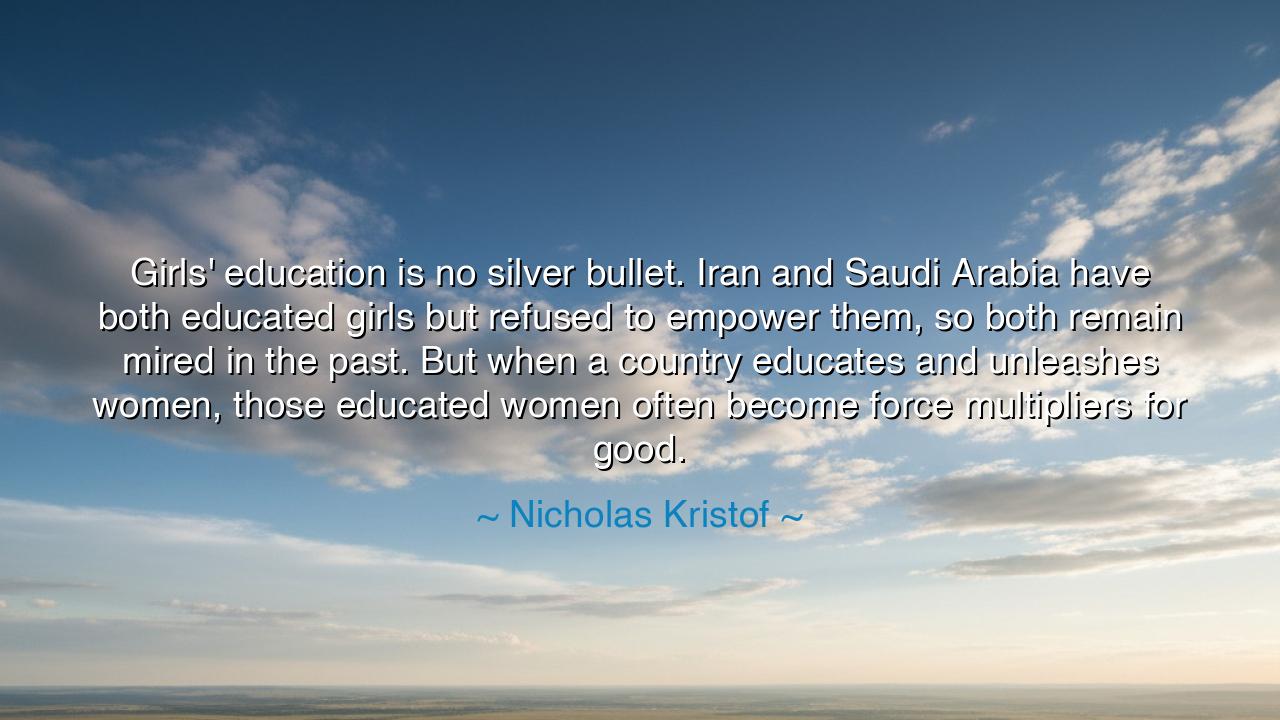
Girls' education is no silver bullet. Iran and Saudi Arabia have
Girls' education is no silver bullet. Iran and Saudi Arabia have both educated girls but refused to empower them, so both remain mired in the past. But when a country educates and unleashes women, those educated women often become force multipliers for good.






When Nicholas Kristof, the journalist and humanitarian, wrote, “Girls’ education is no silver bullet. Iran and Saudi Arabia have both educated girls but refused to empower them, so both remain mired in the past. But when a country educates and unleashes women, those educated women often become force multipliers for good,” he spoke not only as an observer of nations but as a chronicler of civilization’s most enduring struggle — the struggle between progress and fear, between enlightenment and oppression. His words burn with the light of truth: that education, though powerful, is incomplete without empowerment; and that the destiny of nations rises or falls with the freedom of their women.
The origin of this quote lies in Kristof’s lifelong work across the world — from the villages of Africa to the streets of Asia — where he witnessed firsthand how the education of girls transforms societies. Yet he also saw the tragic contradiction: countries where girls attend school, learn mathematics and literature, even excel in science, and yet find themselves shackled by law, culture, or custom. His words remind us that knowledge without freedom is like a bird taught to fly within a cage. It has wings, but no sky. Empowerment — the right to choose, to act, to lead — is what turns education into transformation.
When Kristof speaks of Iran and Saudi Arabia, he points to civilizations rich in culture and intellect, yet restrained by the chains of patriarchy. In these nations, many women have learned, but few have been permitted to lead. The result, he says, is stagnation — the stillness of a society that teaches its daughters to think, but not to act. This is a warning echoed across history: knowledge confined becomes poison to the soul of a nation. For education that does not lead to liberty breeds frustration, and talent left unused turns to silent rebellion. The true flowering of society comes only when education and empowerment walk hand in hand.
Consider, by contrast, the nations that have unleashed their women. In the 20th century, as women gained education and voice in countries like Japan, South Korea, and the Nordic states, they did not merely join society — they reshaped it. They entered classrooms, hospitals, and parliaments; they created policies for families, innovation for economies, and compassion for governance. Their minds became force multipliers for good, amplifying progress in every field. The lesson is clear: when a woman rises, she lifts her nation with her. For every educated woman becomes not only a worker, but a teacher; not only a dreamer, but a torchbearer lighting the path for others.
This truth is as ancient as humanity itself. In every age, civilizations that honored their women thrived, and those that silenced them fell into ruin. The Egyptians revered Isis, mother of wisdom; the Greeks learned from Diotima, philosopher of love; and even in the medieval world, Hildegard of Bingen wrote symphonies and treatises when few believed women capable of thought. The pattern is eternal: where the feminine mind is honored, knowledge expands, harmony deepens, and culture ascends. Where she is chained, ignorance reigns, and the soul of the nation withers.
Yet Kristof’s words are not condemnation alone — they are a call to awakening. He tells us that the education of girls must go beyond literacy; it must become liberation. To teach a girl to read is noble; to teach her to lead is divine. Empowerment is not a gift from rulers — it is a right that must be recognized and respected. And those who stand for progress must understand that equality is not a favor to women; it is salvation for humanity. For the strength of a civilization is measured not by the might of its armies or the wealth of its kings, but by the freedom of its daughters.
The lesson of Kristof’s quote is as practical as it is profound: it calls every community, every government, every parent to open the gates of possibility for their girls. Educate them, yes — but also trust them, employ them, elect them, and let them dream without limits. A nation that silences its women silences half its genius; a nation that unleashes them releases double its destiny. If humanity is to advance beyond hunger, war, and injustice, it will do so by walking on two legs — male and female, side by side.
And so, let these words ring like a prophecy across the generations: Educate and empower. For education gives wings, but empowerment gives wind. When both unite, women become not only the keepers of wisdom, but the architects of the future. And wherever such women rise — in classrooms, in fields, in parliaments, in homes — the world itself begins to rise with them, carried upward by the unstoppable grace of enlightened womanhood.






AAdministratorAdministrator
Welcome, honored guests. Please leave a comment, we will respond soon